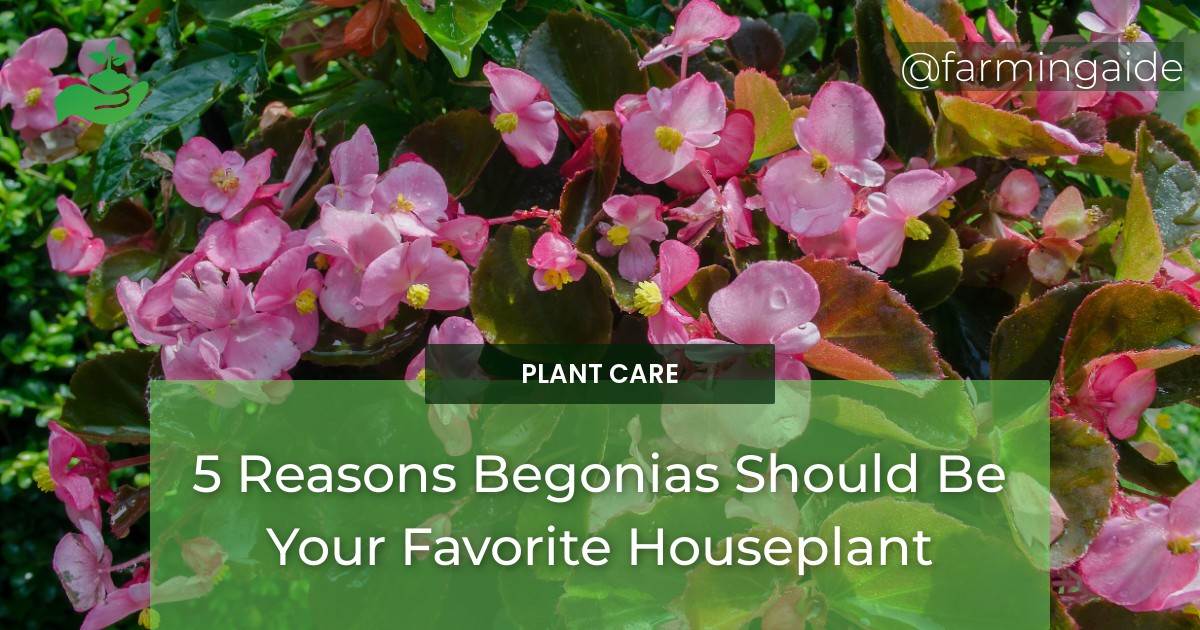Begonias are a popular choice for houseplants, and for good reason. These beautiful plants not only add a touch of color and life to any indoor space, but they also offer a range of benefits that make them a top choice for indoor gardening. From air purification to low maintenance care, begonias have a lot to offer. In this article, we will explore the many reasons why begonias should be your favorite houseplant, as well as popular varieties and tips for caring for these stunning plants.
Benefits of Begonias
Air Purification
Begonias are known for their ability to purify the air in your home. These plants absorb toxins and pollutants, making the air cleaner and healthier to breathe. This makes begonias a great choice for those with allergies or respiratory issues.
Low Maintenance
One of the biggest advantages of begonias is their low maintenance nature. These plants are easy to care for and can thrive in a variety of conditions. They require minimal watering and can tolerate low light levels, making them a great choice for busy individuals or those new to indoor gardening.
ALSO READ
Gorgeous Blooms
Begonias are known for their stunning blooms, which come in a variety of colors and shapes. From vibrant reds and pinks to soft pastels, there is a begonia to suit every taste. These blooms can last for weeks, adding a touch of beauty to any room.
Varied Colors and Shapes
In addition to their beautiful blooms, begonias also come in a variety of leaf shapes and colors. Some have large, showy leaves while others have intricate patterns and textures. This diversity makes begonias a great choice for adding visual interest to your indoor space.
ALSO READ
Pet Safe
For those with furry friends, begonias are a safe choice for houseplants. Unlike some other popular indoor plants, begonias are non-toxic to pets, making them a worry-free option for pet owners.
Popular Begonia Varieties
Angel Wing Begonias
Angel wing begonias are known for their large, wing-shaped leaves and clusters of delicate flowers. These plants prefer bright, indirect light and well-draining soil.
Rex Begonias
Rex begonias are prized for their colorful and patterned leaves. These plants prefer bright, indirect light and high humidity.
Dragon Wing Begonias
Dragon wing begonias are a popular choice for hanging baskets, thanks to their cascading growth habit. These plants prefer bright, indirect light and well-draining soil.
Rhizomatous Begonias
Rhizomatous begonias are known for their unique leaf shapes and patterns. These plants prefer bright, indirect light and well-draining soil.
Tuberous Begonias
Tuberous begonias are prized for their large, showy blooms. These plants prefer bright, indirect light and well-draining soil.
How to Care for Begonias
Light Requirements
Begonias prefer bright, indirect light. Placing them near a window with a sheer curtain is ideal. Avoid direct sunlight, as it can scorch the leaves.
Watering and Humidity
Begonias prefer to be kept evenly moist, but not waterlogged. Water when the top inch of soil is dry, and be sure to provide adequate humidity by misting the leaves or placing the plant on a tray of pebbles and water.
Soil and Fertilizer
Begonias prefer well-draining soil that is rich in organic matter. Fertilize every 2-3 weeks during the growing season with a balanced fertilizer.
Pruning and Repotting
Prune begonias to maintain their shape and remove any dead or damaged leaves. Repot every 1-2 years, using a pot that is slightly larger than the current one.
Pest and Disease Control
Begonias are generally pest and disease resistant, but can occasionally be affected by mealybugs, aphids, or powdery mildew. Treat with an insecticidal soap or neem oil if necessary.
Propagation
Begonias can be propagated through stem cuttings or by dividing the plant. Cuttings should be taken in the spring or summer and placed in moist soil or water until roots form.
How Can Begonias Be Used in Creative Ways in Your Garden and Home Decor?
Begonias can bring a pop of color and beauty to your garden and home decor. Try hanging begonia baskets on your patio or using them as a centerpiece for outdoor dining. Get creative begonia garden decor ideas by planting them in unique containers or incorporating them into a living wall display.
Conclusion
Begonias are a versatile and beautiful choice for indoor gardening. With their air purifying properties, low maintenance care, and stunning blooms, it’s no wonder they are a favorite among houseplant enthusiasts. By choosing the right variety and providing proper care, you can enjoy the beauty of begonias in your home all year round.


